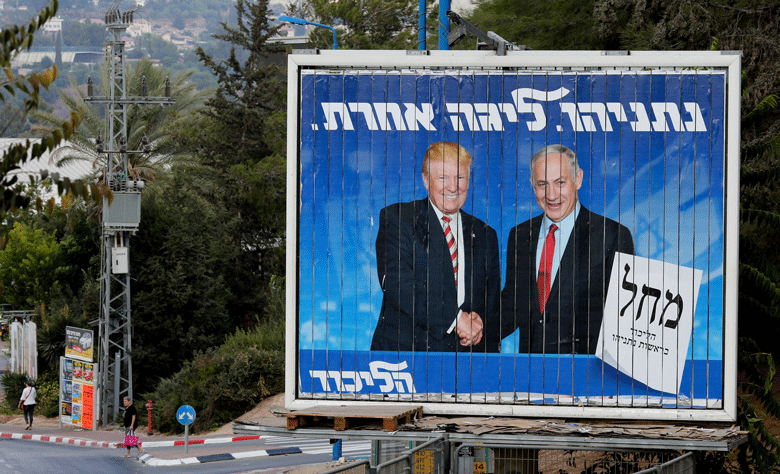

For a man who prides himself on his ability to make deals, even penning a book called ‘The Art of the Deal’, US President Donald Trump has stumbled at the first hurdle with his proposed Middle East peace plan by bringing only one side to the table.
It was implausible from the outset that a leader as capricious as Trump would be able to balance Israeli and Palestinian demands, where previous US presidents have fallen short.
But while the wholesale exclusion of the Palestinian perspective is laughable, it is hardly surprising, as the current administration's hopelessly unilateral vision for an Israeli-Palestinian settlement became evident as early as June last year at the US-led economic forum in Bahrain.
At that event, Jared Kushner, Trump’s son-in-law and senior adviser, presented a $50bn 10-year plan he said was "the opportunity of the century".
It included a $27.5bn investment plan for the Palestinian territories of West Bank and Gaza, again without Palestinian leaders or their support.
The latest proposal is just as remarkable for its deafness to most key Palestinian demands, ignoring the illegality of Israeli settlements in the occupied West Bank under international law and refusing to recognise the Palestinian right to a sovereign state with normal state institutions.
Land swap
Instead, the terms of the peace plan read more like an Israeli wish list.
It proposes locking in Israel’s seizure of land in East Jerusalem and settlement of the occupied West Bank and Gaza, while continuing to deny Palestinians fundamental rights.
The plan also includes a proposed land swap in which the Palestinians would be compensated for Israel’s seizure of fertile agricultural land in the West Bank with an expanse of barren land in uninhabited areas of the Negev desert along the Egyptian border.
In exchange for accepting this settlement, the Palestinians gain little: no right to return, no unconditional route to statehood, no right to have armed forces, nor even to fully control their own security in the land left to them.
This so-called peace plan also raises the prospect of stripping Israeli citizenship from tens of thousands of Arab Israelis living in border towns, and thereby also depriving Israeli citizens of their rights, presumably in violation of Israel’s own constitution.
Risk of conflict deepening
The favouritism shown to Israeli political hawks over key Palestinian demands will likely prove damaging to the role the US has played up until now as an arbiter between the two sides.
As Nicholas Burns, a former senior US state department official, noted on Twitter: “President Trump’s Middle East plan is clearly good for Israel but not for the US. It forfeits any presence of fairness and consigns the Palestinians to live as stateless people on their own land. It will deepen, rather than resolve, this seven-decade conflict.”
The end result is an unrealisable proposal that adds weight to the notion that the US has abandoned the Palestinian cause.
It will also potentially bolster Israeli Prime Minister Benjamin Netanyahu's re-election prospects, which is ironic in its timing given that Trump is himself in the process of being impeached over his attempts to manipulate the 2020 US election.
If the announcement of the peace plan does indeed result in the re-appointment of Netanyahu to office, then that may well be its only achievement, because it cannot hope to produce much else.
Carefully phrased responses
The superficially positive messages of support from the attending representatives of a handful of other Arab nations are in reality a downgrade on the more positive expressions of interest made by the Arab World and particularly the Gulf states at the 2019 Bahrain summit.
Saudi Arabia responded with appreciation for “the efforts of President Trump’s Administration to develop a comprehensive peace plan between the Palestinian and Israeli sides”, but put the emphasis on the effort and not the plan itself.
If that is the most vocal message of support that can be drawn from the US’ staunchest Gulf ally, it does not bode well for the prospect of negotiations moving forward, particularly if the plan requires Gulf investment.
Outside of the region, Trump’s peace plan received endorsement from the UK Prime Minister Boris Johnson, who asserted: “No peace plan is perfect, but this has the merit of a two-state solution. It would ensure Jerusalem is both the capital of Israel and the Palestinian people.”
Yet it is hard to take Johnson seriously when his response contradicts the facts of the proposed plan and is so transparently aimed at garnering favour with Trump as the UK prepares to begin trade negotiations with the US.
In reality, Trump’s peace plan already has one foot in the grave. Not only will it never be seriously discussed or countenanced by the Palestinians, but it will also fail to persuade us that Trump is a master dealmaker.
You might also like...

Rainmaking in the world economy
19 April 2024

Oman receives Madha industrial city tender prices
19 April 2024

Neom seeks to raise funds in $1.3bn sukuk sale
19 April 2024

Saudi firm advances Neutral Zone real estate plans
19 April 2024
A MEED Subscription...
Subscribe or upgrade your current MEED.com package to support your strategic planning with the MENA region’s best source of business information. Proceed to our online shop below to find out more about the features in each package.





